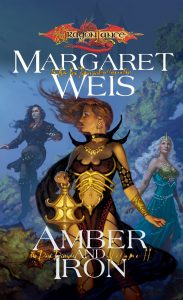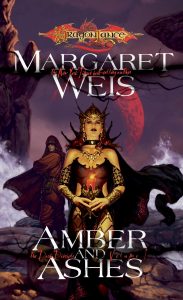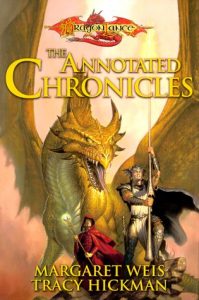 It has been nearly 18 years since I read the first book in the Dark Disciple trilogy. Crazier than that, only 18 years means the review is accessible! The remaining entries of the trilogy have sat on my to-read shelf for maybe as long as they’ve each been out, yet I’m not sure whether I ever would have read them despite my intentions, except D&D[1] is finally releasing more DragonLance source material, which means I am hypothetically all of those 18 years behind on the ongoing plot of the world. (Or they reset / went back in time? I have not, to be honest, read any of the new game material yet to check.)
It has been nearly 18 years since I read the first book in the Dark Disciple trilogy. Crazier than that, only 18 years means the review is accessible! The remaining entries of the trilogy have sat on my to-read shelf for maybe as long as they’ve each been out, yet I’m not sure whether I ever would have read them despite my intentions, except D&D[1] is finally releasing more DragonLance source material, which means I am hypothetically all of those 18 years behind on the ongoing plot of the world. (Or they reset / went back in time? I have not, to be honest, read any of the new game material yet to check.)
The downside, if you clicked through, is that the prior book wasn’t, you know, very good. One thing I’ve hoped as things go forward is that the authors were trying to bring the world back to something that makes sense, after the Fifth Age BS that TSR[2] forced on them in the late ’90s / early 2000s. Is that what is happening? I’ve only read a second book out of three, so my qualified answer is: maybe!
Amber and Iron is, on a moment by moment basis, at least okay. I consistently cared about what was happening with most of the characters (kender, monk, a handful of gods, and a, er, dark disciple), and I for sure liked some of the plot elements (the drowned Tower of High Sorcery at the bottom of the Blood Sea of Istar? yes please!). But when I step back and take a look at the story as a whole, man, it does not make a lick of sense.
Did they try to solve the vampiric cult thing? Sure, and reasonably so. Did anything else that happened make sense relative to the previous book? Maybe, but how should I know? Nearly 18 years, I believe I mentioned. Did anything else that happened make a lick of sense relative to itself? Nearly nothing, no, I don’t even know why it’s “and Iron” in the title!
And yet, perversely, I still want to know what happens next. Because it will make this book retroactively make sense after all? Could happen, but it’s not why. Because I want to know what happens to the characters? I sort of do, but that’s not really why either. Because I want to know what happens to Krynn? See, now we’re talking. I love that world in a way I love few others. It’s just always been my jam.
[1] Blah blah blah OGL controversy. For these purposes, take it as read that I super don’t care. If Weis and Hickman take Krynn to a different game system, we can talk then.
[2] Or maybe it was already Wizards of the Coast? How should I know?!

 When I was a wee lad, I read a ton of those AD&D Dragonlance books, pretty well indiscriminately. There came a time in my late teens when I realized that some, okay most, of the books in that setting were pure crap, and that they didn’t actually have to be suffered through in order to know the entire story. Ultimately, books written by authors who didn’t create the characters I was trying to read about, in which the characters did completely ridiculous things that they probably would never have done anyway and certainly would have mentioned doing… these kinds of books could be ignored. It was a pretty happy day, when I finally worked that out for myself.
When I was a wee lad, I read a ton of those AD&D Dragonlance books, pretty well indiscriminately. There came a time in my late teens when I realized that some, okay most, of the books in that setting were pure crap, and that they didn’t actually have to be suffered through in order to know the entire story. Ultimately, books written by authors who didn’t create the characters I was trying to read about, in which the characters did completely ridiculous things that they probably would never have done anyway and certainly would have mentioned doing… these kinds of books could be ignored. It was a pretty happy day, when I finally worked that out for myself.